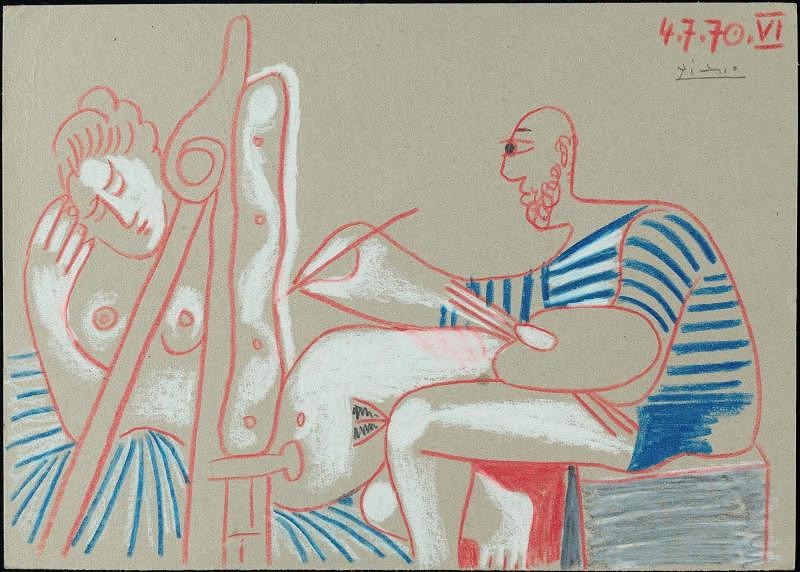AlreadyBeenDone

Pablo Picasso: Le Peintre et Son Modèle (1970)
"I do not want somebody different greeting me now."
Picasso had what some might have considered a very bad habit. He insisted upon producing paintings that had AlreadyBeenDone, often by painters judged far superior to him. Who could count how many 'painter with his model' canvasses he produced? Certainly scores if not hundreds, each one replicating a pattern at least as old and done as any subject he could have imagined. Authors do this, too, I'm moved to reflect. Someone once postulated that there were no more than six original plots in existence. Six plots to cover the entirety of human history in every language. The likelihood that my book or yours will introduce that long-elusive seventh plot seems unlikely, if not utterly impossible. It's common for an aspiring author, though, to notice that he's not been totally original and perhaps borrowed a few features from another author, one he's in awe of or jealous of. What constitutes an original work and where might plagiarism begin or end? ©2021 by David A. Schmaltz - all rights reserved
We're all, it seems, standing upon each others shoulders. I've read hundreds of police procedurals, each one remarkable similar, each one also quite unique. Each in the style of its author, which renders even a retelling of Little Red Ridinghood different. The voice, not just the plot, lends a sense of uniqueness to a work. I struggle through bouts of AlreadyBeenDone, where I successfully convince myself that whatever I've attempted to write amounts to at least back-handed plagiarism. I squelch my clear, albeit small voice by considering it unoriginal. At those times, I might have written tens of thousands of pages, but it sure seems to me that in all that exposition, I have, at root, said nothing uniquely mine or, if a thread of originality somehow managed to squeak in, it had already been said better by a better writer than I'll ever become. AlreadyBeenDone's a debilitating virus.
I might consider how often I choose to have something completely original for breakfast. Rarely. Even when I manage to experience something utterly different for breakfast, I notice that I'm pining after one of my old familiars. Nothing beats a bowl of my gruel for breckie! I might occasionally diverge from one of the lazy half dozen choices I usually allow myself, but rarely. I would not, under any circumstances, want to have to face an utterly unique breakfast on anything like a daily basis. In breakfast as, perhaps, in literature, I prefer the familiar, perhaps with just a small twist. I often read my New Yorker at breakfast, and while each article certainly seems different, a consistent editorial voice and page layout renders as familiar even the more avant guarde pieces I encounter.
Readers, too, rarely seek very much novelty in their written material. I rather quickly forget the details of anything I read. I frequently return from the library to find that I'd forgotten I'd read one or more of the books I've just checked out. Authors, too, might rewrite what they've dispatched before. I swear every John Sandford novel is precisely the same as every one before. They're still serial bestsellers. They've found a formula that works. Their plots unfold at a familiar pace and while different characters populate each story, the villains and the good guys seem somehow infinitely interchangeable and hardly original. I read those books like I might check in with an old acquaintance, reassured that they're not behaving very much differently than they behaved the last time I checked in.
Of course it's AlreadyBeenDone, but never in my voice, not precisely like this. I'm almost certain—never completely certain of anything—that I've written this very essay perhaps a half dozen times before this day, but I cannot remember when that was or precisely what I said. I might have come to a completely different conclusion, but probably not. We speak in familiar dialects and tell the self same stories over and over and over again, rather like reassuring mantras. When I pull a favorite author's work off the shelf, I want to find that familiar author in there, not somebody completely different, no matter how unoriginal the work might seem. I'm back because I last time enjoyed who that author seemed to be. I found his voice reassuring. I do not want somebody different greeting me now. You probably don't either. Ask Picasso how much original he left behind him. He might respond with "tout" or "rien."


